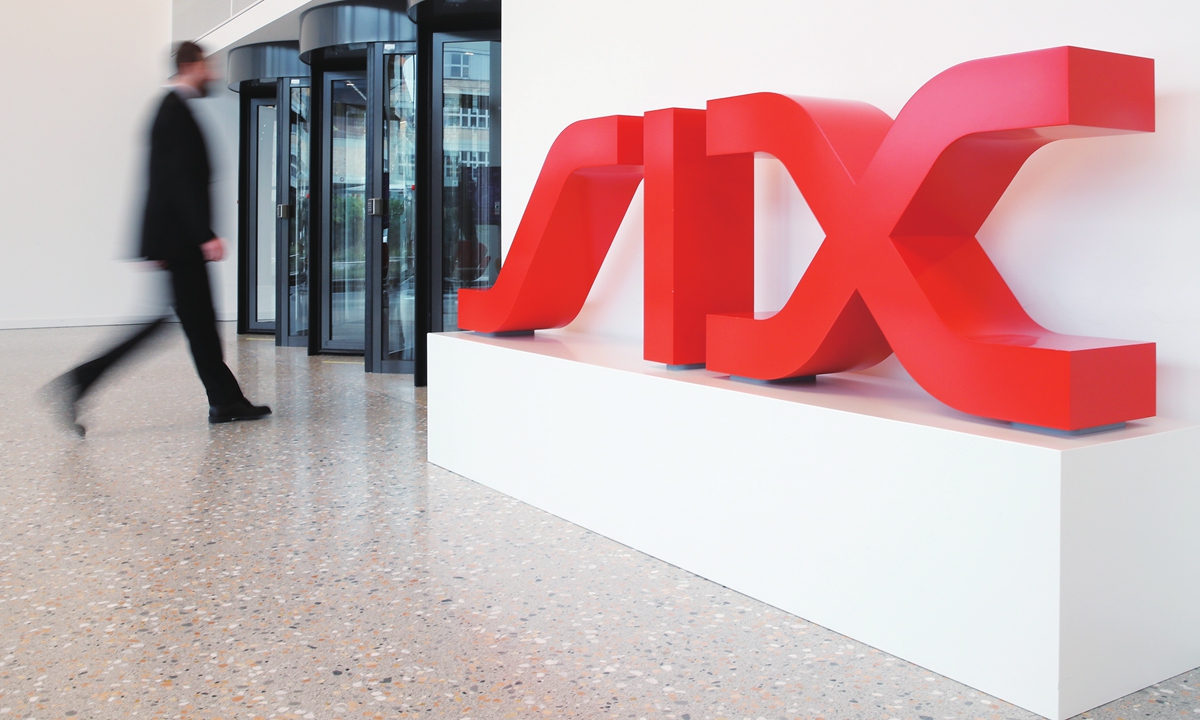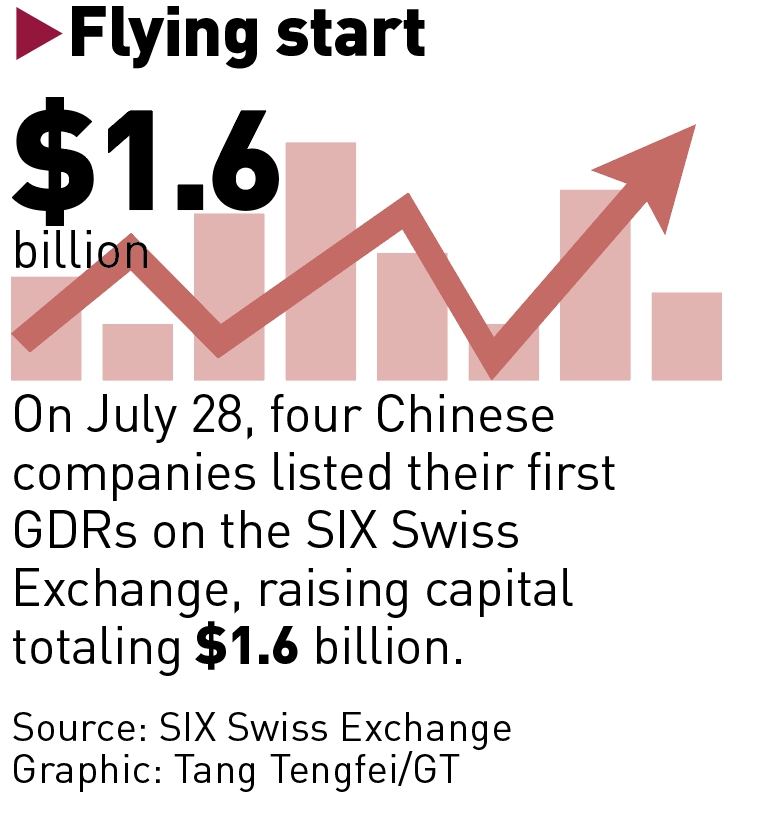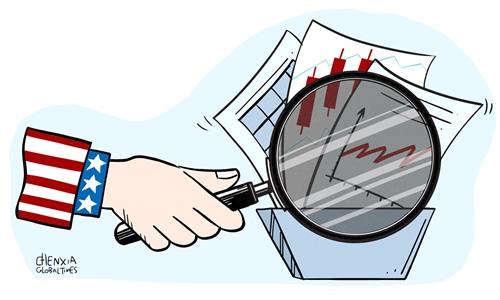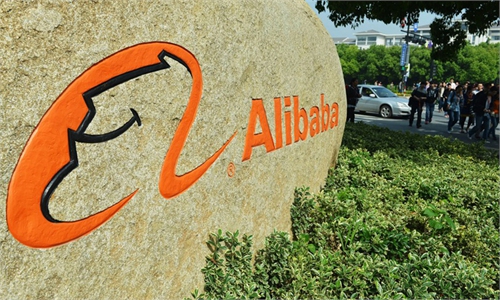Chinese enterprises tap into Switzerland capital market amid US' reckless financial 'decoupling'
US’ reckless financial 'decoupling' will backfire as more enterprises seek alternative bourses to raise funds

A street view of Bern, Switzerland Photo: VCG
Amid an increasingly volatile and complex international environment as well as delisting risks in the US, Chinese listed companies have been turning to other markets such as Switzerland to raise funds while fending off the fallout caused by China-US geopolitical tensions.
Experts said this marks an important move in promoting the two-way opening-up of China's stock market, and the fast growth of other overseas markets will soon mean the US stock market is not irreplaceable. They urged the US to correct its mistakes and build a fair and predictable business environment for Chinese companies.
On Monday, Shanghai-listed B2B platform Beijing United Information Technology Co announced that it plans to issue Global Depositary Receipts (GDRs) to get listed in SIX Swiss Exchange, Switzerland's principal stock exchange, according to a filing on the Shanghai Stock Exchange.
The company said the move will help it expand international financial channels to meet the needs of the company's domestic and overseas business and elevate the company's international brand and corporate image.
GDRs are bank certificates issued in more than one country for shares in a foreign company. They are commonly used when the issuer raises capital in the local market as well as in the international markets, either through private placement or public offerings.
Chinese companies have accelerated the pace of seeking listings in Europe this year, with more than 10 Chinese companies having announced similar plans, according to media reports.
On July 28, four Chinese companies listed their first GDRs on the SIX Swiss Exchange, raising capital totaling $1.6 billion, the exchange said in a press release. The four companies are GEM, Gotion High-tech, Keda Industrial Group and Ningbo Shanshan.
It's worth noting that in order for Chinese companies to list GDRs in Switzerland, the existing regulatory framework for GDRs was amended and entered into force on 25 July, the exchange said.

SIX Swiss Exchange Photo: VCG
"As a leading financial hub in Europe, Switzerland has a relatively mature financial environment and capital market, with a higher degree of opening-up and fairness. This makes it attractive for foreign firms," Dong Dengxin, director of the Finance and Securities Institute of the Wuhan University of Science and Technology, told the Global Times.
Compared with directly launching IPOs in overseas markets, the cost of GDR issuance is lower, and that the issuer is already listed on the A-share market makes it easier for their GDRs to be approved in overseas markets, Dong said, noting that allowing Chinese companies to issue GDRs is an important part of China's capital market reform.
The recent flurry of GDR issuances came as the China Securities Regulatory Commission revised provisions of the Stock Connect program between domestic and overseas stock exchanges in February this year to expand its scope to include the Shenzhen Stock Exchange, along with stock exchanges in Switzerland and Germany.
Previously, only companies listed on the Shanghai and London stock exchanges could participate in the Stock Connect mechanism.
"It's with expectations for Chinese companies to shift focus to Europe as the US has been increasingly politicizing its capital market," Dong said.
He said that the China-Europe stock connect enriches investment targets for international investors and more international capitals are expected to flow into China via Europe, which will be conducive to strengthen economic and trade relation between China and Europe and therefore prevent risks of the US' financial decoupling with China.
"Backed up by China's stable economic growth, high-quality A-share companies are attractive to global investors. While the US keeps threatening to delist batches of Chinese firms, capital markets in countries including Switzerland, Germany, the UK and France will gradually grab this opportunity," Cao Heping, an economics professor from Peking University, told the Global Times.

Graphic: Tang Tengfei/GT
The US will soon find out that it is not irreplaceable, he said, noting that Washington should correct its mistakes to build a sound business environment for the listing of foreign firms, including those from China to allow Americans to share China's development dividends.
Besides Europe, US-listed Chinese mainland companies are also seeking dual listings in others markets such as Hong Kong Special Administrative Region to avoid the US government' reckless crackdown.
As the US Securities and Exchange Commission added the largest US-listed Chinese company Alibaba to its list of Chinese companies that might be delisted, the company announced to upgrade its secondary listing on the Hong Kong Stock Exchange to a primary one, with the process expected to be completed by the end of 2022.
HKSAR Financial Secretary Paul Chan Mo-po told the Global Times in a recent interview that more than 20 US-listed mainland companies are returning to Hong Kong, accounting for over 70 percent of the total capitalization of Chinese mainland firms trading in the US.
Hong Kong hopes to adjust some stock market rules to make it more convenient for the return of these companies, he said.



